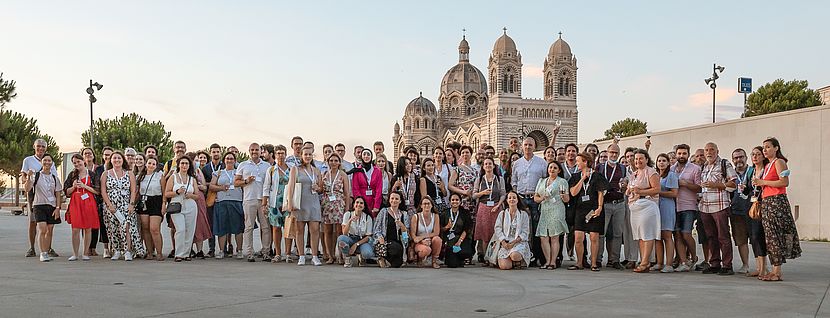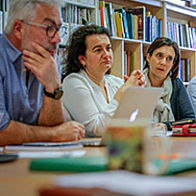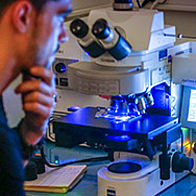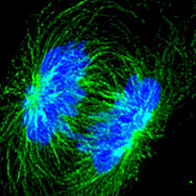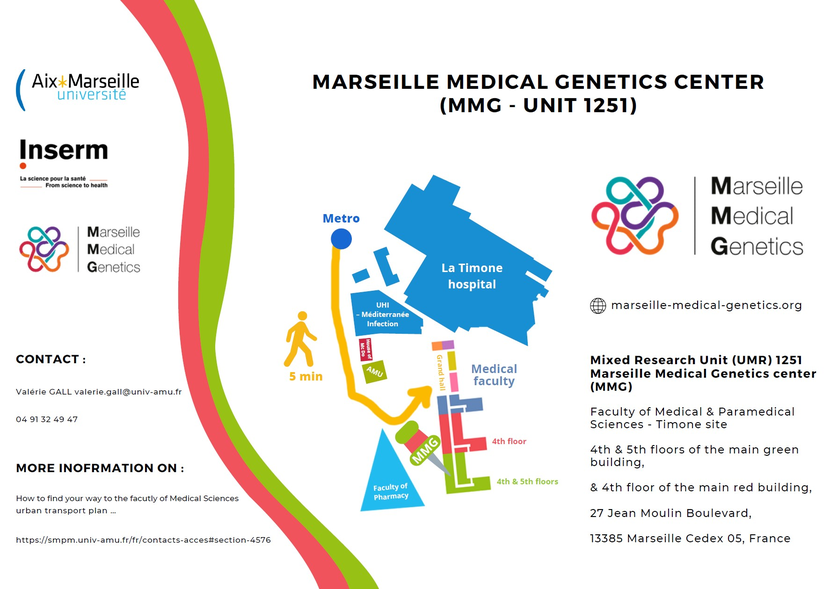About MMG
Marseille Medical Genetics
About us
Located at the heart of the third largest European university hospital center, Marseille Medical Genetics (MMG) has a triple mission:
- Decipher mechanisms involved in genetic diseases
- Develop new diagnostic tools and therapeutic strategies
- Improve quality of life of patients affected by these rare diseases
By bringing together researchers and clinicians, MMG has created the optimal conditions to tackle the challenge of understanding and treating rare diseases. This is strongly facilitated by the “loop” approach from bedside to bench and back, the strong implication of patients and their advocacy groups in our research, and collaborations with industry. In addition, communication with the general public and education are strong elements of our lab's culture.
Organized as eight independent research teams, approximately 160 researchers, clinicians, engineers, post-docs, technicians and students at any time seek to improve our knowledge of different types of rare disease by combining the study of patient cohorts with that of pathophysiological models using state-of-the-art technologies within four core facilities.
Led by Dr Frédérique MAGDINIER (first-class research director at INSERM, the French National Institutes of Health and Medical Research), MMG is a basic and clinical research unit jointly affiliated with INSERM and the MarMaRa (Marseille Rare Disease) Institute of Aix-Marseille University (AMU).
Organization
The Marseille Medical Genetics Research Center is located at the Timone hospital and medical school campus in the heart of Marseille.
Our research center is one of the leading European research centers in the field of rare diseases, from gene identification to pathophysiology, clinical studies to translational research. MMG is closely connected to the Timone and Conception hospitals and the AMU medical campus with physicians and scientists sharing their activity between both structures.
Our research focuses on understanding the mechanisms leading to rare diseases and developmental disorders of the central and peripheral nervous systems (causing brain dysfunction or neuro-endocrine pathologies), pigment cells, skeletal muscle and heart, as well as pathologies associated with defects of nuclear envelope proteins, particularly those involved in premature aging. The recruitment of patients and constitution of cohorts is facilitated by interactions with clinical departments, biological resource centers and the strong involvement of clinicians, biologists and geneticists in the research carried in the Center. The access to biological resources is central to the development of the majority of MMG research programs, the development of models including cellular and pre-clinical models and validation of targeted therapies.
Most of our work, including the most fundamental, is thus performed in the context of ambitious translational research, contributing to the diagnosis and management of patients with the aim of better understanding the pathophysiological mechanisms associated with disease, improving prevention or care and developing treatment.
As research in biology is constantly evolving in its multidisciplinarity, many of our research projects involve collaborations with a broad range of subject areas (physics, mathematics, optics and social sciences) and contribute to multicentric, transversal research programs in developmental biology, epigenetics, systems biology, bioinformatics, and stem cell biology.
MMG, led by Dr. Frédérique Magdinier, is organized around:
- Eight independent research teams
- A common technical and administrative department
- Four technological core facilities
- Collective decision-making committees with a board of group leaders and topic-specific steering committees
- A laboratory council involving the director, the chief administrative officer, the team leaders, two representatives of the technical and administrative staff, a representative of the AP-HM staff, a representative of Aix-Marseille University, two PhD student and two post-doctoral fellow delegates
- Dedicated commissions (equipment, purchasing, animal facilities, quality management processes, mentoring)
- A coordinated policy for recruiting permanent researchers
